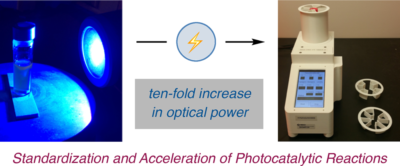As someone who did his PhD on photochemistry, I have always been surprised at how little photochemistry is used in making new molecules, given the unusual transformations that photochemistry can enable. However, there has been a resurgence in the use of photochemistry in the last decade in academic laboratories. But the equipment had hardly changed in the 50 years since I started my PhD. Now, the group of MacMillan at Princeton and Merck researchers at Rahway, New Jersey have devised a new, more efficient integrated photoreactor (ACS Central Science, 2017, 3, 647-653) that has been engineered to simplify lab use, optimise photon capture and speed reactions. The equipment comprises a modular LED source, a holder for 2-40ml vials and a reflector for maximising light usage and additional safety features. The reactor was tested on eight photoreactions including trifluoromethylations, decarboxy-fluorination and photocatalytic C-N coupling.









